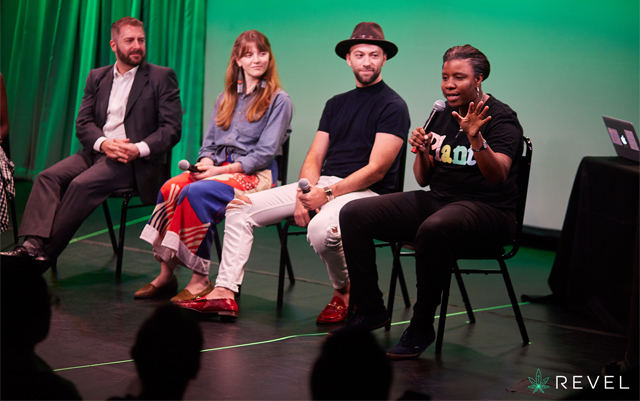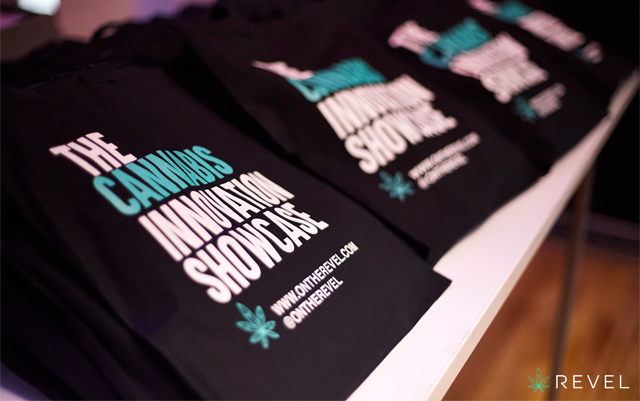New York City’s cannabis networking community is thriving for a state yet to legalize adult-use cannabis. One of the more standout events is REVEL’s quarterly get-together and info session.
The eighth installment of the series – presented by founders Lulu Tsui, Jacobi Holland and select cannabis sponsors – was held at Downtown Manhattan’s SubCulture space, offering a cozy venue for over a hundred attendees to meet and then focus on the stage. This season’s theme focused on cannabis and brands.
The evening was moderated by Cannaclusive Strategic Partnerships Director Arlene Pitterson and featured presentations from a variety of individuals in the space. They include established entrepreneurs, burgeoning brand co-founders and an expert in mergers and acquisitions (M&A).

Matt Kittay, partner and national co-chair of M&A activity for Fox Rothschild LLP was first to present. With just one slide, Kittay laid out some of the legal hurdles brands need to consider and avoid when launching a cannabis venture.
Kittay explained that, due to current federal law, there are no federal trademark opportunities for cannabis brands. As such, he mentioned attempting to brand all things around the business except cannabis. The more successful way is on the state-by-state level. However, it can lead to branding issues down the line. This includes non-cannabis companies conflicting with a cannabis brand, or two marijuana businesses disputing with one another.
He gave various examples with cannabis conflict in non-cannabis brands, which included parody and coincidental similarities. When discussing cannabis-on-cannabis disputes, Kittay noted one issue in particular. “There’s a Harvest in almost every state where cannabis is legal,” Kittay said.
Kittay added, “It’s the result of not choosing a unique name when you’re going to market with your particular brand. And the result is that Harvest in different states are fighting each other as we go from a state-by-state or regional or national brand presence.”
Raelina Krikston, Chief Creative for Haiikuu Design, a Mendocino County-based firm that began in Colorado, discussed her methodology to branding. Krikston offered case studies, showing how a creative can take elements of what a client insists upon and finding solutions that satisfy the client while striking the needed tone for consumers. She also mentioned having a hard time accepting a title like ‘cannabis expert’, but seemed to fit the bill when onstage.
She also expanded on how educational marketing, mainly rapport building aimed at fostering trust, is vital. Krikston told The Marijuana Times about one current problem educational marketing seeks to address. “The market’s so young and so new and knowledge is so low that if something looks good this is how people judge the quality of product.” Other educational marketing efforts she mentioned include responsible consumption and cannabinoids, among several others.

Successful campaigns can help improve consumer confidence as well, according to Krikston. “I truly feel people want to align their values with their dollars, you know, supporting local farmers, sun-grown, things that aren’t intensive in terms of resources and things like that. But they don’t know what to look for. So if you educate the market, then they know what [to look for].”
Thomas Giordonello is a New York-based public relations professional who will soon be moving to Los Angeles to launch his own agency, Hotline PR, with business partner Ryan Robles.
Giordonello explained to The Marijuana Times that Hotline aims to create a forward-thinking brand. This includes seeking notable sponsors and partners that aren’t always involved or known for cannabis at the moment. “I’m trying to bring a new wave of influencers into the projects that I’m doing,” he explained.
During his presentation, Giordonello spoke about brand awareness from a PR perspective, delving into how a company can gain attention despite regulations that block most traditional means for cannabis companies. Four key areas he said a brand must aim to succeed in are packaging, product, brand story and the company’s vibe.
The last presenter of the evening was Washington state’s Joy Hollingsworth, co-founder of the family-ran The Hollingsworth Cannabis Company. Fan of the late Anthony Bourdain’s No Reservations may remember the company from his Seattle episode.
Hollingsworth gave an insightful and hilarious presentation, delving into the experience of a black family-owned venture in Washington, a state where vertical integration is not allowed. In a bid to create generational wealth for the family, Joy and her brother Raft convinced her father to cash in his retirement fund to launch the company.
Six years later, the company is thriving, hiring locals as employees while the family got in on the action as well. Though, no one may be more of a fan than her nearly 99-year-old grandmother, who serves as the company’s inspiration.
Hollingsworth’s grandmother was born in 1902 on the same South Carolina farm where her ancestors were slaves. She’d eventually migrate to Seattle and become the first black person to graduate and get her Master’s at the University of Washington. She went on to become Seattle’s school board president and help desegregate the schools.
After providing an unforgettable brand story, Hollingsworth capped off the example by adding, “This [venture] didn’t start in 2013 for us. This started way back when with our ancestors, with my grandmother, and that’s our brand: black-owned and operated. Unapologetically black.”
The four presenters and Pitterson all provided the audience of entrepreneurs and interested individuals with a diverse glimpse into how a brand can be formed in cannabis despite the setbacks presented by current laws.
In short, brands should remain unique while trying to avoid the pitfalls of cliche cannabis branding, like the words ‘high’ or ‘canna’, or decking the product out in green. More so, they should remain authentic to their story while attempting to create quality branding that appeals to customers while still satisfying regulations, and hopefully educating the consumer along the way.






